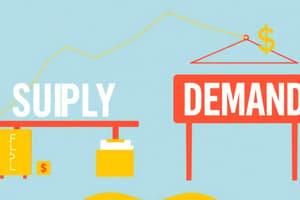Podcast
Questions and Answers
Which economic system is characterized by individual decision-making with minimal government intervention?
Which economic system is characterized by individual decision-making with minimal government intervention?
- Traditional Economy
- Market Economy (correct)
- Mixed Economy
- Command Economy
What does the opportunity cost represent in economic decision-making?
What does the opportunity cost represent in economic decision-making?
- The financial cost associated with a choice
- The combined costs of all alternatives considered
- The cost of not choosing the next best alternative (correct)
- The total economic benefit of a decision
Which of the following best describes the primary focus of macroeconomics?
Which of the following best describes the primary focus of macroeconomics?
- The marketing strategies of firms
- Aggregate measures like GDP and inflation (correct)
- Behavior of consumers in individual markets
- Production and pricing of single goods
What economic model illustrates the interactions of households and firms in an economy?
What economic model illustrates the interactions of households and firms in an economy?
In which type of market structure do a small number of firms have significant control over pricing?
In which type of market structure do a small number of firms have significant control over pricing?
Which economic theory promotes the idea of self-regulating markets with minimal government interference?
Which economic theory promotes the idea of self-regulating markets with minimal government interference?
What is the term used to describe the difference between exports and imports of a country?
What is the term used to describe the difference between exports and imports of a country?
Which of the following is not a key indicator used in economic analysis?
Which of the following is not a key indicator used in economic analysis?
Which type of economic policy involves government taxation and spending to influence economic activity?
Which type of economic policy involves government taxation and spending to influence economic activity?
What is the main purpose of monetary policy?
What is the main purpose of monetary policy?
Flashcards are hidden until you start studying
Study Notes
Key Concepts in Economics
Fundamental Principles
- Scarcity: Limited resources vs. unlimited wants.
- Supply and Demand: Interaction that determines prices in a market.
- Opportunity Cost: The cost of forgoing the next best alternative.
Economic Systems
- Market Economy: Decisions made by individuals; minimal government intervention.
- Command Economy: Central authority makes decisions; government controls resources.
- Mixed Economy: Combination of market and command economies.
Microeconomics vs. Macroeconomics
- Microeconomics: Study of individual markets and the behavior of consumers and firms.
- Macroeconomics: Study of the economy as a whole, focusing on aggregate measures like GDP, unemployment, and inflation.
Key Indicators
- Gross Domestic Product (GDP): Total value of goods and services produced in a country.
- Unemployment Rate: Percentage of the labor force that is jobless and actively seeking work.
- Inflation Rate: Rate at which the general level of prices for goods and services rises.
Types of Economic Policies
- Monetary Policy: Control of the money supply and interest rates by central banks.
- Fiscal Policy: Government spending and tax policies to influence economic conditions.
Market Structures
- Perfect Competition: Many firms, identical products, free entry and exit.
- Monopolistic Competition: Many firms, differentiated products, some pricing power.
- Oligopoly: Few firms, products may be identical or differentiated, interdependent pricing.
- Monopoly: Single firm dominates the market, significant pricing power.
International Economics
- Trade Balance: Difference between a country's exports and imports.
- Exchange Rates: Value of one currency for the purpose of conversion to another.
- Globalization: Increasing interdependence of economies through trade, investment, and technology.
Economic Theories
- Classical Economics: Belief in self-regulating markets and limited government intervention.
- Keynesian Economics: Advocates for active government intervention to manage economic cycles.
- Supply-Side Economics: Emphasizes tax cuts and deregulation to stimulate economic growth.
Behavioral Economics
- Studies how psychological factors influence economic decision-making and market outcomes.
Common Economic Models
- The Circular Flow Model: Illustrates the flow of goods, services, and money in an economy.
- The Production Possibility Frontier (PPF): Shows the maximum output possibilities for two products given resources.
Important Terms
- Elasticity: Measure of how much demand or supply changes with price changes.
- Market Failure: When the allocation of goods and services is not efficient.
- Public Goods: Goods that are non-excludable and non-rivalrous, leading to free-rider problems.
These notes cover essential concepts in economics and provide a foundation for further study and understanding of the subject.
Key Concepts in Economics
Fundamental Principles
- Scarcity highlights the imbalance between limited resources and unlimited human wants.
- Supply and Demand dictate market prices through their interaction; higher demand typically increases prices, while higher supply tends to decrease them.
- Opportunity Cost is the value of the forgone alternative when a choice is made, emphasizing the trade-offs in decision-making.
Economic Systems
- Market Economy: Operates predominantly on individual decisions with minimal government involvement, encouraging competition.
- Command Economy: A centralized authority dictates resource allocation and economic decisions, limiting personal choice.
- Mixed Economy: Blends elements of market and command economies, utilizing both government intervention and individual freedom.
Microeconomics vs. Macroeconomics
- Microeconomics focuses on specific sectors, examining the behaviors of consumers and firms in individual markets.
- Macroeconomics analyzes the overall economy, concentrating on aggregate indicators like GDP, unemployment rates, and inflation trends.
Key Indicators
- Gross Domestic Product (GDP) measures the total economic output of goods and services within a country, reflecting national economic health.
- Unemployment Rate represents the proportion of the labor force that is without work but actively seeking employment, indicative of economic stability.
- Inflation Rate gauges the percentage increase in prices for goods and services, impacting purchasing power and cost of living.
Types of Economic Policies
- Monetary Policy is managed by central banks to control the money supply and influence interest rates, affecting overall economic activity.
- Fiscal Policy involves government spending and taxation strategies designed to stimulate or cool down the economy.
Market Structures
- Perfect Competition features many firms selling identical products, resulting in no single firm's influence over market prices.
- Monopolistic Competition includes numerous firms offering differentiated products, allowing for some price-setting ability.
- Oligopoly describes a market dominated by a few firms whose pricing strategies are interdependent, often leading to collusion.
- Monopoly exists when a single firm controls the entire market, significantly impacting prices due to lack of competition.
International Economics
- Trade Balance calculates the difference between a country's exports and imports, affecting currency value and economic health.
- Exchange Rates determine the value of one currency relative to another, influencing international trade and investment.
- Globalization reflects the growing interconnectedness of national economies through increased trade, investment flows, and technological exchange.
Economic Theories
- Classical Economics advocates for self-regulating markets with minimal governmental interventions, promoting free enterprise.
- Keynesian Economics supports government involvement to mitigate economic downturns and manage cycles through fiscal policy.
- Supply-Side Economics posits that tax cuts and deregulation can stimulate economic growth by encouraging investment and production.
Behavioral Economics
- Analyzes the impact of psychological factors on economic decision-making, providing insight into market behaviors that deviate from traditional theories.
Common Economic Models
- The Circular Flow Model visualizes the exchange of goods, services, and money between households and firms, illustrating economic interdependence.
- The Production Possibility Frontier (PPF) depicts the maximum potential output for two distinct products, demonstrating resource allocation efficiency.
Important Terms
- Elasticity measures the sensitivity of demand or supply in response to price changes, crucial for understanding market reactions.
- Market Failure occurs when a market does not allocate resources efficiently, often necessitating intervention to correct inefficiencies.
- Public Goods are characterized by being non-excludable and non-rivalrous, leading to challenges like the free-rider problem in funding and provision.
Studying That Suits You
Use AI to generate personalized quizzes and flashcards to suit your learning preferences.




